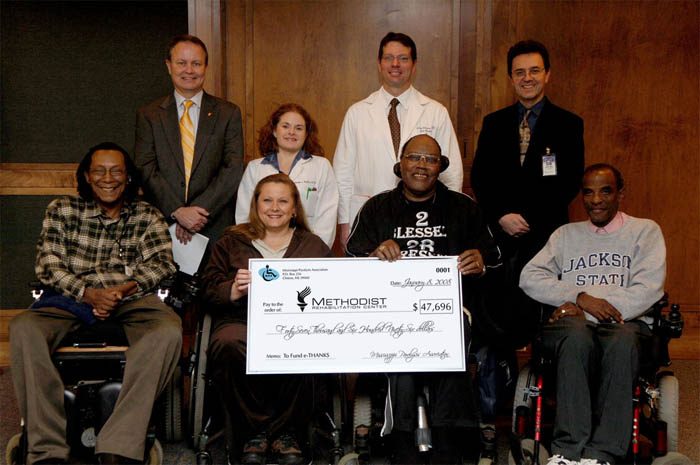

JACKSON, Miss.—Critical self-care strategies will soon be a few clicks away for spinal cord injury (SCI) patients in Mississippi.
Methodist Rehabilitation Center is putting the information online, thanks to a $47,696 grant from the Mississippi Paralysis Association (MPA).
MPA Executive Director Natalie Ellis of Clinton said the money will fund the Jackson hospital’s eTHANKS project, a Web-based program that will serve as a ’round-the-clock resource for SCI patients striving to stay healthy.
“By using this resource, we hope people will be able to head off the various secondary conditions that cause people to be re-admitted to the hospital,” Ellis said. “At MPA, we’re big fans of doing anything we can to get people living as normal a life as possible.”
Dr. Dobrivoje Stokic of Ridgeland, administrative director of research at Methodist Rehab, said the new program builds on the success of the hospital’s original Transitioning Home and Acquiring Necessary Knowledge about Self-Care (THANKS) project, which was also funded by MPA.
Participants in that program learned self-care strategies via scheduled phone conversations with a rehabilitation nurse. But enrollees in eTHANKS will be able to access information whenever they need it using home computers.
“Each participant will first be evaluated in our Adaptive Computing Lab to determine their equipment and training needs,” said George Gober of Brandon, assistive technology associate at Methodist Rehab. “Then we’ll set them up to connect to our Website via home computer.”
The new set-up comes on the heels of a Methodist Rehab study that found a majority of participants reported a need for information even years after discharge from an acute care setting. Issues related to aging healthfully topped the list of topics of most interest to SCI patients.
To answer that need, the Website will eventually include more than 1,000 pages of information pertinent to spinal cord injury patients. Education modules will address health care issues related to the circulatory system, respiratory care, spasticity, bladder and bowel management, skin care and the handling of pain and emergency medical issues.
While many patients are taught such self-care strategies in the hospital, Ellis said not all are ready to absorb it.
“When you are newly injured, you are still dealing with the trauma of being paralyzed," she said. “You can’t think of anything but the fact you can’t walk any more."
“You look at being injured like it’s a dream and you’re going wake up and it’s all over,” said MPA president Lamar Myers of Madison. “But it’s not.”
Ellis and Myers – who were both paralyzed in car accidents – said they were fortunate to land in rehab when therapists could spend more time hammering home self-care skills.
“I stayed two months and quadriplegics stayed six months or longer,” said Ellis, a paraplegic. “Now people are going home in two or three weeks, and that’s not long enough to get all the information they need to take care of themselves.”
The eTHANKS project is just the latest in a series of partnerships between MPA and Methodist Rehab’s research division, and Dr. Stokic said the hospital is grateful for the association’s support.
“They are very responsive to addressing the needs of people with spinal cord injuries by providing both research support and service,” he said. “It’s a productive working relationship”
Besides being an educational resource for the spinal cord injury population, eTHANKS also will serve as an important research tool, Gober said. For instance, data will be collected to determine the effectiveness of online educational programs for the prevention of secondary conditions such as pressure sores.
Gober said eTHANKS will first be made available to people who are inpatients at Methodist Rehab. After completion of the developmental stage of the program, plans are to make the program available to anyone interested in self-care after a spinal cord injury.
People with questions about the development of the project can email Gober at ggober@mmrcrehab.org.
